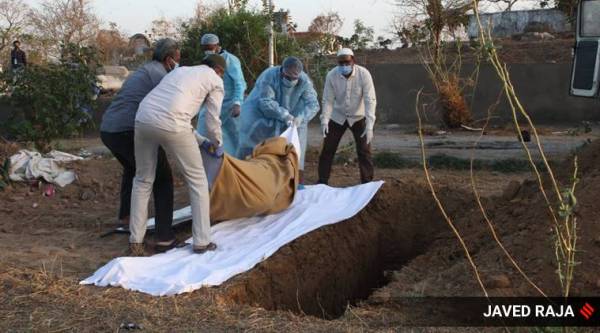 Since COVID-19 is a respiratory disease, the only safety measure that needs to be observed is maintaining distance from viruses present on the surface of a body and its secretions. (Express photo/Javed Raja)
Since COVID-19 is a respiratory disease, the only safety measure that needs to be observed is maintaining distance from viruses present on the surface of a body and its secretions. (Express photo/Javed Raja)
Health activists have addressed the issue of whether dead bodies of people infected by COVID-19 pose a threat to others.
“There were similar feelings while disposing off dead bodies of HIV patients forty years ago,” said activists of the Poona Citizen Doctor’s Forum and Prayas Health Group. “No one was ready to perform or even attend the last rites. But the fear faded with the help of public awareness and practical experience that people gained. This should also happen within a month in the case of COVID-19.”
“COVID-19 is a respiratory disease; the virus spreads through sneezing or coughing, and stops when the patient dies. The only safety measure that needs to be observed is maintaining distance from viruses present on the surface of a body”, said Dr. Anant Phadke from Poona Citizen Doctor’s Forum, “and its secretions. Hence, to avoid touching the dead body and the secretions from its mouth and nose without wearing gloves is the only precautionary measure to be observed”, he added.
Emphasising on safety of healthcare personnel and relatives of the victim, the Ministry of Health and Family Welfare has issued guidelines for hospital staff regarding measures to be undertaken while handing over bodies to relatives. For instance, disposing of the tubes inserted in the nose and mouth of the patients should happen after immersing them in one per cent sodium hypochlorite solution (bleaching solution), due precautions should be taken while wiping off any secretions through the nose, mouth or open wounds of the body, the body should be rolled up in a plastic bag – which should be wiped from the outside with the bleaching solution and then covered with a second layer – and the remaining clothes and belongings of the patient should be sanitised with the bleaching solution.
According to Dr. Vinay Kulkarni from Prayas Health Group, after these measures have been taken, there is no risk that can be posed for those travelling in the hearse with the body, lifting the body (while wearing gloves) or performing the last rites – as long as the body is not touched with bare hands. One does not need to cover themselves from head to toe with a “cover all suit” like the hospital’s ICU doctors do, he added.
Activists said some other precautions that need to be followed include wearing masks, washing hands with soap, using hand sleeves to avoid directly touching the mouth, eyes or nose, maintaining a distance of six feet from other people, taking a bath as soon as one comes home and immersing clothes in soap water. The virus cannot survive in the ashes after a body is cremated, or even in the soil where it is buried. Hence, there is no need to spray disinfectant on the ashes or place of burial, activists added.